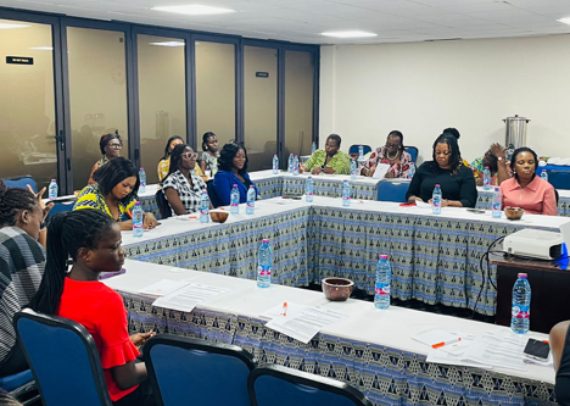A section of the participants at the press conference
Coordinator for the Affirmative Action Law (AAL) Coalition, Becky Enyonam Ahadzi, has called on electorates to vote for female political figures seeking to be part of the ninth parliament.
She said having more females in parliament is essential for promoting gender equality, challenging patriarchal norms, and ensuring women’s voices are heard in decision-making processes.
Therefore, it will be a great achievement if women are voted massively into office in the upcoming elections elections.
Becky Enyonam made this known at the press conference on increasing women’s participation and representation in the 2024 General Election and on the implementation of Ghana’s Affirmative Action (Gender Equity) Act, 2024 (ACT 1121) organised by ABANTU for Development.
She further stated that women parliamentarians can represent the interests of women and other marginalised groups more effectively, adding that women bring unique experiences and perspectives to the table, leading to more informed and nuanced decision-making.
Executive Director of the International Federation of Women Lawyers (FIDA-GHANA), Susan Aryeetey, lamented over the current women representatives in parliament saying, “40 women out of 275 are MPs, a mere 14.55 percent of the legislature and the number is likely to reduce in the coming elections.”
She further stated that the new Affirmative Action (Gender Equity) Act now legally requires a minimum of 30 percent of women in decision-making positions by 2026, rising to 50 percent by 2030.
“There is an urgent need to rally support for female parliamentary candidates to come to this election for fair representation,” she added.
She also entreated female political figures to fashion strategic lobbying skills for other high public offices.
“Women are far more than being women organisers in our various political parties. We should not stand there doing nothing. We need to also lobby for the positions just as our male counterparts are doing,” she advised.
Complementing this legal framework, ABANTU for Development launched an election monitoring project targeting five districts across three regions including Adansi Asokwa in Ashanti, Ga West and Tema West in Greater Accra, and Birim Central and West Akim in the Eastern Region.
The Senior Programmes Officer of ABANTU, Mary Akromah, stated that the project, supported by Star Ghana Foundation and the Foreign Commonwealth and Development Office, aims to create direct pathways for women’s political engagement.
“Our project is about creating opportunities for women to enter political leadership,” she stated.
The initiative unites political parties, civil society groups, media, and development partners to support women candidates and expand political opportunities for women across the country.
BY Prince Fiifi Yorke


